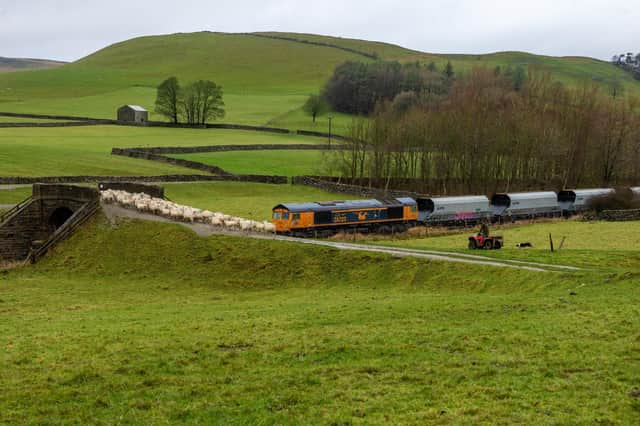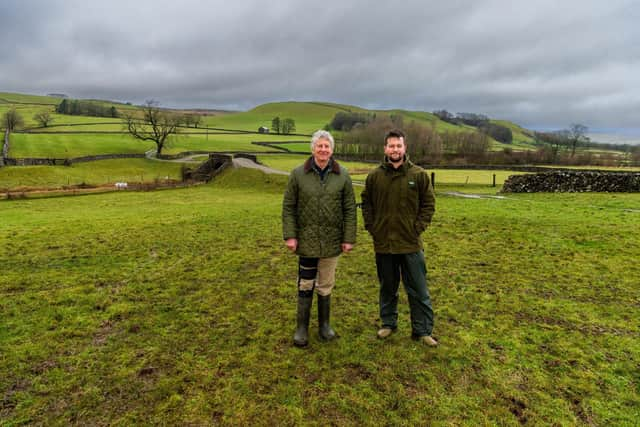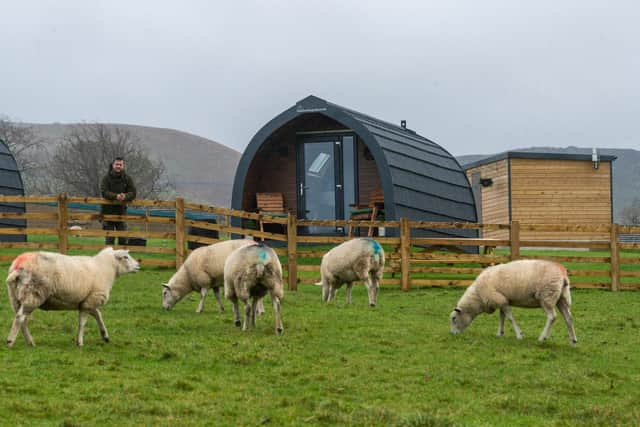Farm of the Week: Younger generation diversifying Dales hill farm amid post-Brexit uncertainty over future


Last weekend hill farmer Tom Carlisle of Coxons Farm in Cracoe starred as Long John Silver in the village pantomime Treasure Island that he had also written and directed, but on Monday he was back, minus his stage apparel, selling fat lambs at the livestock market in Skipton.
Tom is a past member and now a club leader of Upper Wharfedale YFC and as such is well used to being involved with the local community. Tom said he is also now a partner in the family farming partnership with his parents John and Julie.
Advertisement
Hide AdAdvertisement
Hide Ad“I came into the partnership last year as my grandfather Donald stepped out of it, so it has been like a progression.


“I’m the fifth generation to farm here and although in my teenage years I wasn’t necessarily thinking too much about whether I was going to farm, it was one summer that I thought I really enjoy this.
“A lot of people can feel pressurised into being a part of their family farm for the future, but I never had that. My parents told me I could do what I wanted to do, which was quite nice to have that freedom.”
Tom spent three years studying agriculture at university in Newcastle and then returned to the 420-acre farm that is primarily a sheep operation with a flock of 650 Mule-cross-Texels and Texel and Beltex-crosses, plus a suckler herd of 40 Limousin-cross and British Blue-cross cows.
Advertisement
Hide AdAdvertisement
Hide AdTom said they are quite strict on their sheep-keeping discipline.


“We like young, fit sheep. Our ewes average around four-shear. We find that if we keep sheep a bit older we can have problems.
“By keeping a young flock we are usually around two lambs per ewe at turning out. We scanned at 210 per cent last year.
“We keep around 100 Mules with the rest all being Texel-crosses. We buy-in around 20 Mules each year. The Texel is put to the Mule to bring the Texel-cross and then we cross again with a Texel or Beltex tup which provide the threequarter-bred Texel or Beltex lambs that go to Skipton.
Advertisement
Hide AdAdvertisement
Hide Ad“Lambing starts in the middle of March and goes through to the end of April. We start selling lambs at around four months old in July and the last of the lambs went on Monday this week.”
Tom said the aim is for all lambs to be away to market by around this time. “We normally get all of the current year’s lambs destined for the fat lamb market away by Christmas with some going as stores if we can’t get them to fat weight.
“We farm at 650 feet which means we sometimes struggle for grass. Having the fat lambs away by Christmas means the fields can have a break and grow again ready for the upcoming lambing season.”
Tom said that during winter they send 200 shearlings to Penrith which eases the pressure further on the fields.
Advertisement
Hide AdAdvertisement
Hide Ad“They go just before Christmas and come back at the beginning of March. At this time of year the ewes are still running with the tup. When the tup is taken away the ewes will go up on some higher ground. We will bring them back down nearer lambing time when we will give them some hay and cake.”
While the farm’s land is classed as either in disadvantaged or severely disadvantaged status and nobody knows quite what the future holds, Tom said the price of lamb in the market this year has been better news.
“Coming out of the EU there were predictions of as much as a 40 per cent decrease, which was quite worrying. As it has turned out, so far it has been quite different. Nobody knows how long it will last but it has certainly been positive in the short term.”
Tom said the suckler herd calves during May with all stock produced generally sold as stores.
Advertisement
Hide AdAdvertisement
Hide Ad“Our bull calves go at around 10-11 months and the heifer calves at 16-17 months. They mostly go into Skipton but we do sell some of our really good heifers privately for breeding which we are always pleased about.
“We sell all the calves and bring in new cows as replacements often previously through the market. We have recently been buying British Blue-cross cows from my fiancée Aimee who farms with her dad at Hellifield where they also have a beef and sheep farm.”
Tom said that better stock is something he is passionate about whether producing quality replacements for the sheep flock or taking the cattle up a notch or two.
“I’ve been wanting to build on what we have and bringing in the British Blue cows has helped. We have also been buying better tups for the ewes. We have been upping our game and improving our livestock over the past 10 years.”
Advertisement
Hide AdAdvertisement
Hide AdTom said that Mid-Tier stewardship also plays its part in the farm’s operation as well as a new diversification enterprise into glamping pods he and Aimee have been responsible for setting up.
“We have some ground nesting bird schemes and we have recently been walling where the farm borders the moor.
“The glamping pods were initially my idea and Aimee then jumped on board and has been amazing. We have two and we have been really encouraged by the bookings we have received in the first four months.
“Coming out of the EU I thought we had to diversify in some way and watching TV one night I saw what we now have. They’re very high quality pods and I thought they looked really good.”
Advertisement
Hide AdAdvertisement
Hide AdTom and Aimee were members of their respective young farmers clubs of Upper Wharfedale and Coniston Cold but came together when meeting at Gargrave Show.
Aimee said the pantomime theme is something that she shares through her father.
“My dad used to write the pantomimes for our village, but I’m happy just working the bar.”